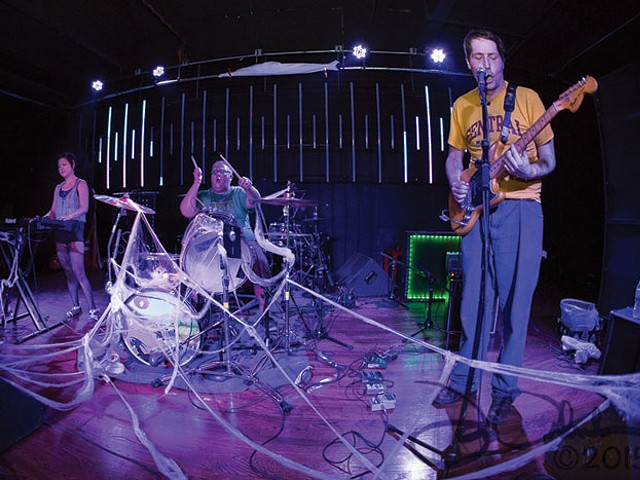How does anyone determine success as an artist — from the number of views on a song uploaded to YouTube or Soundcloud? By how much money has been earned? The admiration of a small group of influential critics?
Donald Angelo Schwenk, a lifelong Detroiter who records music under the name DAS, has a different metric. "I have a lifelong goal," he says. "I want to put out records of the songs I wrote. I don't want people telling me how I have to do it. I don't care if anyone hears them, or likes them. I just want to do it my way."
Schwenk has released three albums as DAS over the past 30 years, starting with a 1985 LP titled Non-Chalant (Sir Reel). He's written hundreds of songs and plans on continuing to put out records himself. He does everything: recording, creating the cover art and graphics, releasing and distributing the albums.
He's patient: There was a 25-year gap between his first and second release.
Schwenk recorded his first two albums on cassette, so they have a lo-fi, homespun quality. His songs' hypnotic verses tend to repeat themselves. Keys change within songs; moods eerily shift. There is a tough, punk rock edge to some tracks, but his style is too fluid, too diverse to fit in any one mold. And Schwenk has never been interested in fitting in.
"I played music only for myself," he says. "I'm completely self-taught; I don't know notes, I play my own songs."
Recording original material may not seem that unusual now. But during the '70s era of arena rock and overblown egos, most musicians around Detroit weren't writing and playing their own material. It took a group of wild eastside Detroit brothers who named their band Death to change Schwenk's perspective about what was possible.
While growing up on the city's east side, Schwenk's tastes and interests were influenced by his hippie older brother Bob. He fondly remembers the far-out music: King Crimson, Chicken Shack, and Procol Harum were equally inspirational to Don as Bob's own artistic talent. In 1977, Schwenk graduated with a degree in commercial art from Macomb Community College. An extremely skilled painter and draftsman, he made his living reproducing famous paintings and pen and ink drawings for 10 years before he began his current job as a cabinet maker. But music became his primary passion.
He picked up the bass guitar in seventh grade and played his grandma's old piano, but didn't stick with it. He really started playing music in his early 20s. Schenk had a Conrad Dobro-style resonator guitar with an electric pick-up that he'd play through a reel-to-reel tape recorder, using the tape deck as an amplifier via his home stereo.
"I started playing on the guitar and tried to play like Robert Fripp or John McLaughlin — fast, demonic, repetitive riffs," he says. "But I never learned how to read music or took lessons."
Schwenk's friends were talented musicians who weren't always so enthusiastic about his playing. "Nobody seemed to be playing good, original material back then," he says. "Bands would always play covers. Because I wasn't playing blues rock or covers, people wouldn't let me jam with them. They'd say, 'You can't play.' At house parties, I'd play one song and they'd make me stop. It bummed me out. I went through a lot of isolation and depression, but you have to be isolated to become a good artist."
The band Death has grown in notoriety since being discovered by a wider musical audience in 2009. They were friends with Schwenk from the neighborhood where he lived. The hard-rocking crew influenced him to start writing songs. The group played original material, and he understood and appreciated their outsider status. Death's third album, released in 2014, features the original cover art that Schwenk intended for the group's first album, back in the 1970s.
Schwenk brought Death to contemporary ears by bringing a copy of their rare single into Car City Records and providing a cassette copy of their unreleased album to local music aficionados Matt Smith, Dion Fischer, and Ben Blackwell. Schwenk's connection to Death came full circle when he opened for the band at the Blind Pig in Ann Arbor in November.
"There were a lot of prejudices then," he says. "Nobody wanted to go see a black rock band. Death never really played gigs; just a few house parties. I saw them play when I was 19. I met Dave (Hackney, who passed away in 2000) and used to hang around with him. I actually got to jam with him some, before I even wrote songs."
Matt Grenia, another friend from back in the day, had a friendly competition with Schenk to show each other new songs they'd written. Within a few years, Schwenk had more than 60 songs. He met a drummer who he clicked with named Carl Morrin, and the two looked forward to their lengthy weekend jam sessions.
"We'd play for hours and hours on Saturdays," he says. "Every two or three months we would record for six hours. We recorded hundreds of hours of music." The recordings began in 1983 and were done at home on a stereo cassette recorder with Morrin. A somewhat reluctant bass-player, Gust Loukas, joined up, and the three would play and record live. Another friend, Wally Fritz, added overdubbed saxophone. After several years of amassing hours of recorded material, he decided to self-release an album. This wasn't a common occurrence in 1985. Schwenk's friends were incredulous when he told them he was putting out a record.
"I did my record because of the Death band," he says. "Because Dave told me he was going to make a record. I asked him how and he said, 'You just take the master recording to the printer and have them print it.' I took a half-track tape and made my master tape and took it to Archer Records. And I put the record out.
"Friends would insult me and say, 'You don't have any right to put out a record.' Or complain about the sound quality, because it was recorded on cassette. But now people are into lo-fi, putting stuff out on cassette. I feel like people are doing stuff in the face of the industry. It got so saturated with blandness [back then]."
Non-Chalant features a realist-style cover that Schenk drew, designed, and released on his own label, Sir Reel Records. The strange-looking guitar Schwenk is holding on the album cover is one he built himself.
"Released" is probably the wrong word for Non-Chalant, as Schwenk gave copies to band mates and friends. The rest of the records sat in boxes for almost 25 years. Many of his friends and acquaintances weren't supportive, and interest in his album wasn't great. The vast majority of the records sat unopened until 2007, when Schwenk was at Car City Records and spoke with musician Matt Smith, the mastermind behind Outrageous Cherry, and at the time a clerk at the store.
Smith remembers seeing Schwenk at Car City when the subject of Archer Records came up.
"Don mentioned, 'Oh, they never gave me my artwork back.' I was like, 'Artwork, what artwork?' He said just casually, 'For my record,' and I said, 'What record?' and reluctantly he told me about how he made a record in the '80s. I told him, 'I have a feeling I'd like it, can you bring a copy in for me?'" Smith says.
"He brought a copy in for me, and when I saw him next, I told him, 'I love this record. I asked if he could give me 10 copies that I could give to music guys around town, and the word has spread since then."
The album has a surreal, unworldly sound; some songs deal with topics like astral projection and the beauty of music, but also grounded stories of people and friends: love, hardships, and isolation. Also, for being the product of jamming and recording over several years, the album is remarkably cohesive. Schwenk describes his songs as being based on observing people, as well as trances, and spirit visions. "Art is observing," Schwenk says. "Seeing a person and writing a song that people can listen to and say: 'That's me.'"
Smith says Non-Chalant is "a great record," especially knowing that Schwenk "was working in a climate of 100 percent discouragement."
Since then, Schwenk has played shows to a new and more appreciative audience with drummer Jim Smith. He released a second collection of songs recorded in the '80s titled Artifact in 2008.
The title is actually Artfact on the record's cover, a mistake made while rushing to get the artwork done in time to release the album for a show.
Artifact's sounds are close to Non-Chalant. The songs are just as good, and it is a remarkable follow-up.
Schwenk hasn't stopped creating music. He released an album with Smith in 2011 titled Now. He's since played a solo show featuring only songs he wrote on the piano, and also plans on releasing a trilogy of albums titled Despair, Chaos, and Hope. He'd like to get Despair out this year. His released albums are available at Melodies and Memories, Street Corner Records, and Hello Records.
"My idea for the cover is of me jumping off the Belle Isle Bridge with a rope tied to my foot, and me holding a cinder block over my head," he says. "The songs are all about despairing subjects that make you so sad you want to end it all. That's how life is. Songs about bad love, relationships, work; how sometimes you want to leave town on a Greyhound bus to go to a place where people are civilized and treat you like a person."
Schwenk is still an underground musician playing uncompromising sounds, but the newfound interest in his music after all these years is truly gratifying for him. Although it's taken a quarter-century to find an audience, he's glad that at least some people appreciate what he's doing. "Nobody could feel the way I do with my music, because back then, nobody wanted to hear it," he says. "I can't wait to play."
Editor's Note: This article is an expanded and updated version of a profile that originally ran in the blog Radial Logic.
DAS plays Trinosophes on Wednesday, March 23; Starts at noon; 1464 Gratiot Ave., Detroit; trinosophes.com; The performance is free, but donations will be accepted.






